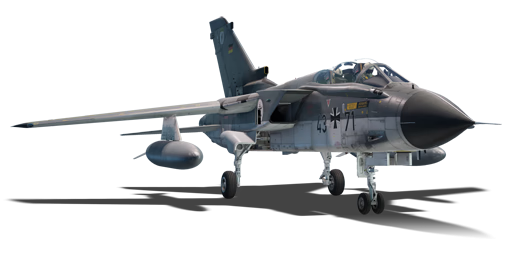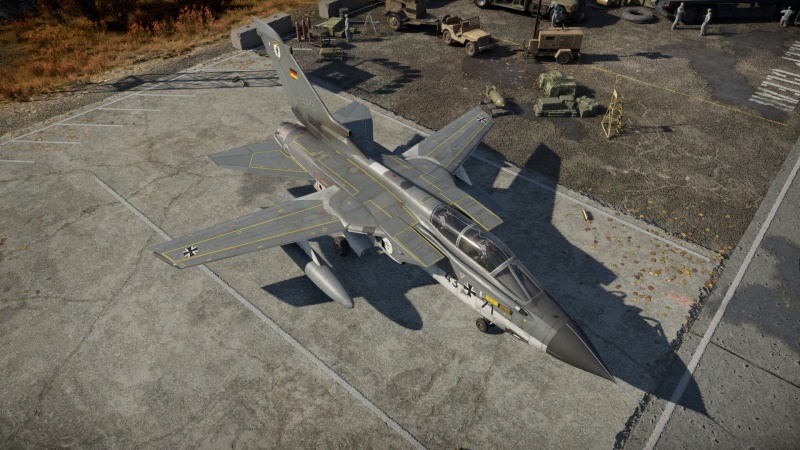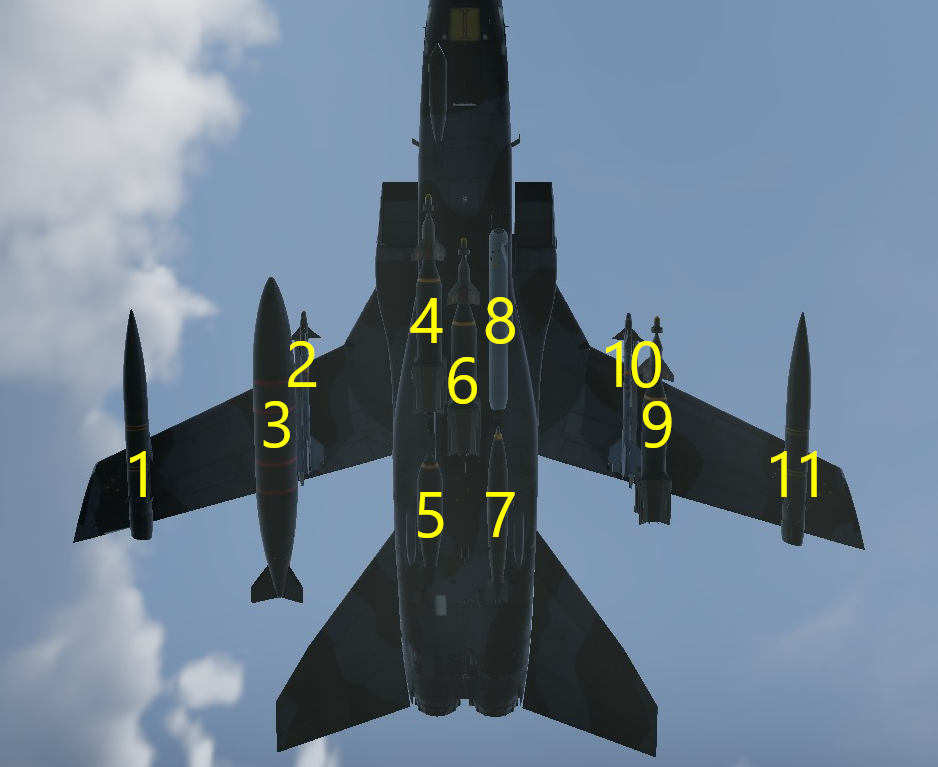Tornado IDS MFG (Germany)
| This page is about the strike aircraft Tornado IDS MFG (Germany). For other versions, see Tornado (Family). |
Contents
Description
During the acquisition of the Tornado IDS by the Luftwaffe, the Deutschemarine (German Navy) also received 112 Tornado IDS aircraft for the anti-shipping and maritime patrol/reconnaissance roles. The naval Tornados, designated "Marineflieger", were easily recognizable due to the sea-gray liveries they usually used, and were outfitted with special weapon systems not found on the Luftwaffe Tornados, allowing them to use the AS.34 Kormoran anti-ship missile and BL775 cluster munitions. At the end of the Cold War, per the CFE Treaty, half of the Marinefliegers would be removed from naval service and instead incorporated into the Luftwaffe, to replace a wing of reconnaissance RF-4 Phantoms. The remaining Marinefliegers would continue their anti-shipping and maritime roles until 2005, when their units were disbanded and the Tornados were dispersed back into the Luftwaffe and upgraded into the ASSTA standard.
The ◄Tornado IDS Marineflieger was introduced during Update "Apex Predators" as a reward for the 2022 Winter Quest event. Being a older Tornado IDS variant, it lacks the ASSTA1 upgrade found on its tech tree counterpart, meaning it can not use guided bombs and advanced targeting pods. However, being the Marineflieger (Naval variant), it gets access to the active radar AS.34 Kormoran anti-ship missiles, a very unique and niche weapon system. The Tornado is not great at air-to-air combat, and as this variant lacks its laser-guided bombs, it's also somewhat underwhelming in mixed battles against tanks. The IDS Marineflieger serves best as a collector's vehicle, due to its rare gift/event vehicle status, unique camouflages, and special weaponry. The aircraft does find a niche use on certain maps in Air Simulator Battles, where its anti-ship missiles can be used against AI controlled naval targets.
General info
Flight performance
| Characteristics | Max speed (km/h at 11,582 m) |
Max altitude (metres) |
Turn time (seconds) |
Rate of climb (metres/second) |
Take-off run (metres) | |||
|---|---|---|---|---|---|---|---|---|
| AB | RB | AB | RB | AB | RB | |||
| Stock | 2,295 | 2,292 | 13000 | 29.4 | 29.5 | 172.1 | 169.8 | 800 |
| Upgraded | 2,324 | 2,308 | 28.6 | 29.0 | 220.0 | 195.0 | ||
Details
| Features | |||||
|---|---|---|---|---|---|
| Combat flaps | Take-off flaps | Landing flaps | Air brakes | Arrestor gear | Drogue chute |
| ✓ | ✓ | ✓ | ✓ | ✓ | X |
| Limits | Wings (km/h) | Gear (km/h) | Flaps (km/h) | Max Static G | |||
|---|---|---|---|---|---|---|---|
| Combat | Take-off | Landing | + | - | |||
| Min sweep | 972 | 560 | 1,166 | 552 | 440 | ~8 | ~3 |
| Max sweep | 1,555 | N/A | N/A | N/A | ~9 | ~3 | |
| Optimal velocities (km/h) | |||
|---|---|---|---|
| Ailerons | Rudder | Elevators | Radiator |
| < 670 | < 650 | < 700 | N/A |
Engine performance
| Engine | Aircraft mass | |||||||
|---|---|---|---|---|---|---|---|---|
| Engine name | Number | Basic mass | Wing loading (full fuel) | |||||
| Turbo-Union RB199-34R Mk.103 | 2 | 14,709 kg | ___ kg/m2 | |||||
| Engine characteristics | Mass with fuel (no weapons load) | Max Gross Weight | ||||||
| Weight (each) | Type | 16m fuel | 20m fuel | 30m fuel | 45m fuel | 56m fuel | ||
| 968 kg | Afterburning low-bypass turbofan | 16,236 kg | 16,523 kg | 17,429 kg | 18,789 kg | 19,799 kg | 25,423 kg | |
| Maximum engine thrust @ 0 m (RB/SB) | Thrust to weight ratio @ 0 m (WEP) | |||||||
| Condition | 100% | WEP | 16m fuel | 20m fuel | 30m fuel | 45m fuel | 56m fuel | MGW |
| Stationary | 3,777 kgf | 7,293 kgf | 0.90 | 0.88 | 0.84 | 0.78 | 0.74 | 0.57 |
| Optimal | 4,192 kgf (1,400 km/h) |
8,155 kgf (1,400 km/h) |
1.00 | 0.99 | 0.94 | 0.87 | 0.82 | 0.64 |
Survivability and armour
Examine the survivability of the aircraft. Note how vulnerable the structure is and how secure the pilot is, whether the fuel tanks are armoured, etc. Describe the armour, if there is any, and also mention the vulnerability of other critical aircraft systems.
Modifications and economy
Armaments
| Ballistic Computer | ||||
|---|---|---|---|---|
| CCIP (Guns) | CCIP (Rockets) | CCIP (Bombs) | CCRP (Bombs) | Lead indicator |
| |
|
|
|
|
Offensive armament
The Tornado IDS MFG (Germany) is armed with:
- 2 x 27 mm Mauser BK27 cannons, chin-mounted (180 rpg = 360 total)
Suspended armament
The Tornado IDS MFG (Germany) can be outfitted with the following ordnance:
| 1 | 2 | 3 | 4 | 5 | 6 | 7 | 8 | 9 | 10 | 11 | ||
|---|---|---|---|---|---|---|---|---|---|---|---|---|
| 1,000 lb LDGP Mk 83 bombs | 1, 2 | 1, 2* † | 1, 2* † | 1* † | 1, 2* † | 1, 2* † | 1, 2 | |||||
| 1,000 lb Mk 83 AIR bombs | 1, 2 | 1, 2* † | 1, 2* † | 1* † | 1, 2* † | 1, 2* † | 1, 2 | |||||
| AIM-9L Sidewinder missiles | 1 | 1 | ||||||||||
| AS.34 Kormoran missiles | 1 | 1 | 1 | 1 | ||||||||
| Large calibre countermeasures | 28 | 28 | ||||||||||
| Large calibre chaff | 340 | 340 | ||||||||||
| 1,500 l drop tanks | 1 | 1 | ||||||||||
| * Bombs on hardpoint 6 cannot be equipped in conjunction with dual bomb mounts on hardpoints 4-8 † AS.34 Kormoran missiles on hardpoints 4/8 cannot be equipped in conjunction with bombs on hardpoints 4-8 | ||||||||||||
| Default weapon presets | |
|---|---|
| |
Usage in battles
Air Realistic battles
If used in Air Realistic battles, the Tornado IDS MFG should be used as a bomber rather than a fighter. Thus you should take 12 x 1,000 lb bombs for bombing and 2 x AIM-9Ls if needed. It is also recommended to take the 58 x countermeasures with you, as these will be your only option for evading a missile. Since the Tornado is very fast, you can quickly fly into the battlefield with afterburners turned on. While flying, you should watch out for enemy planes and missiles. It is best to fly low to the ground - less than 60 m above it - as you will often face Pulse-Doppler radar with missiles such as AIM-7s and R-24R. The combination of the radar with these strong missiles will most likely kill you if you don't pay enough attention.
Once you are close enough to the base, quickly fly up so you can drop your bombs. To get the most out of your IDS MFG, drop half of your bomb load (6 bombs) and keep the other half for another base. Once the bombs are away, you should fly down again to avoid being detected or getting missiles. Then fly to another base and repeat the process.
If you're out of bombs, you can either fly back to base and rearm or make use of your missiles and engage enemy planes. Fire the missiles at unsuspecting targets, which are either in a fight or seem to not pay attention (e.g. when flying back to their airfield in a consistent straight line).
Also, always make sure to look around using your assigned button, since any engagement with an enemy fighter like the F-16, MiG-23 or MiG-29 will put you at a high risk of dying!
Ground Realistic battles
If used in Ground realistic battles, the Tornado can be lethal to enemy tanks due to its great armament. It is advisable to take the same weaponry as in Air battles (see above) since you will need the bombs to destroy ground targets and the AIM-9Ls and Flares/Chaff for any air engagement.
While flying into the battlefield, it is best to - again - fly low to the ground, as enemy fighters or SPAAs can easily shoot you down. So when you spawn, dive down immediately!
When over the battlefield, quickly drop your bombs and fly away as fast as possible. If you want to make another run, because you haven't dropped all of your bombs yet, make sure to avoid detection while turning in the air. If you see on your RWR that SPAAs like the Pantsir-S1 are present, fly back to your airfield and rearm - even if you still have bombs.
Pros and cons
Pros:
- Good acceleration and excellent top speed
- Higher bomb load and speed than SU-22
- Mauser BK27 guns have decent hitting power and ammunition capacity
- Unlike other Tornado versions, has anti-ship equipment (missiles and radar)
- Access to two AIM-9L Sidewinder air-to-air missiles stock
- Can act as a fighter when necessary
- Variable wing sweep allows it to turn better when at low speeds, or during an emergency at high speed (at the risk of destroying itself)
- Radar assisted gun makes intercepting incoming or leaving planes easier
Cons:
- Bad manoeuvrability makes air-to-air combat challenging, low air-to-air missile amount to compensate unlike other attacker options
- No access to guided bombs unlike other Tornados
- Unstable wings, plane can rip itself apart when bombing at maximum speed at low altitude or when doing negative G manoeuvres
- AS.34 Kormoran missiles are rather unreliable weapon even against the ships, the anti-ship search radar cannot locate planes
- Tracking radar (ACM) is limited to 5°x6° until the target is locked
History
Concept
In 1967, the countries of Great Britain, Belgium, Canada, Italy, the Netherlands, and West Germany decided to jointly develop a multirole fighter aircraft to replace the F-104 Starfighter. In 1968, the Netherlands, Canada, and Belgium left the project and the remaining nations signed an initial agreement. The definition phase began in 1969, requirements were placed on the new aircraft. The aircraft should be able to perform conventional and nuclear attacks, as well as aerial reconnaissance and naval warfare. To perform these tasks, the aircraft should have high survivability and be able to fly at extreme low altitudes, with high weapon accuracy in all weather conditions.
Development
In 1969, Rolls-Royce was chosen as the manufacturer of the new twin-jet engine.
Britain prevailed over Germany on the crew: Germany demanded one seat, as they did in the Starfighter. Ultimately, however, the decision was made to have two seats.
Production was split between nations, with being Britain responsible for the cockpit and tail, as well as the vertical stabilizer.
Germany made the center fuselage and air intakes, and Italy made the wings. Final assembly took place from 1973 on the three lines in Warton (Great Britain), Manching (Germany), and Turin (Italy). In 1976, the aircraft, previously known as the MRCA, was given the name Tornado. The first flight took place on August 14, 1974 in Manching (Germany). A total of 10 prototypes and six pre-production aircraft were built, of which the prototype P08 sadly crashed in 1979.
Service
The equipment of the task forces in Great Britain and Germany began in 1982, followed in 1984 by Italy, and in 1986 the only export customer, Saudi Arabia.
From 1990 to 1991, the German Electronic Combat and Reconnaissance variants (ECR) were produced. In 1995, 339 Tornado combat aircraft were in service with the German Armed Forces (Air Force and German Navy). The device unit price (aircraft costs) was estimated at that time at 55 million DM. In 1999, the last newly built Tornado was delivered to the Saudi Arabian Air Force. A total of 977 aircraft were manufactured.
Germany received 359 tornadoes from 1980 to 1991.
The Bundeswehr Navy used the variants IDS, Recce, and ECR.
Media
- Skins
- Videos
See also
- Other jet planes with variable sweep wings
External links
| Panavia Aircraft GmbH | |
|---|---|
| Strike Aircraft | Tornado (Family) |
| Germany | ◄Tornado IDS WTD61 · ◄Tornado IDS ASSTA1 · ◄Tornado IDS MFG |
| UK | Tornado GR.1 · Tornado GR.4 · Tornado F.3 · Tornado F.3 Late |
| Italy | Tornado ADV · ▄Tornado IDS · ▄Tornado IDS (1995) |
| Germany jet aircraft | |
|---|---|
| |
Luftwaffe |
| He 162 | He 162 A-1 · He 162 A-2 |
| Me 163 | Me 163 B · Me 163 B-0 |
| Ho 229 | Ho 229 V3 |
| Ar 234 | Ar 234 B-2 · Ar 234 C-3 |
| Me 262 | Me 262 A-1a · Me 262 A-1a/Jabo · Me 262 A-1a/U1 · Me 262 A-1/U4 · Me 262 A-2a |
| Me 262 C-1a · Me 262 C-2b | |
| |
LSK |
| Fighters | ◊MiG-15bis · ◊Lim-5P · ◊MiG-19S |
| ◊MiG-21MF · ◊MiG-21bis-SAU · ◊MiG-21 "Lazur-M" | |
| ◊MiG-29 | |
| Attackers | ◊MiG-23BN · ◊MiG-23MF · ◊MiG-23MLA |
| ◊Su-22UM3K · ◊Su-22M4 | |
| ◊IL-28 | |
| |
Luftwaffe |
| F-84 | ◄F-84F |
| F-86 | ◄CL-13A Mk 5 · ◄CL-13B Mk.6 · ◄F-86K |
| F-104 | ◄F-104G |
| F-4 | ◄F-4F Early · ◄F-4F · ◄F-4F KWS LV |
| G.91 | ◄G.91 R/3 · ◄G.91 R/4 |
| Tornado | ◄Tornado IDS WTD61 · ◄Tornado IDS MFG · ◄Tornado IDS ASSTA1 |
| Other | Alpha Jet A · ◄Sea Hawk Mk.100 |
| Ex-LSK | ◄MiG-21 SPS-K · ◄MiG-29G · ◄Su-22M4 WTD61 |
| |
Swiss Air Force |
| ◌Hunter F.58 · FFA P-16 | |






